NEW YORK — With homebound nominees appearing by remote video and hosts Tina Fey and Amy Poehler on different sides of the country, a very socially distanced 78th Golden Globe Awards trudged on in the midst of the pandemic and a storm of criticism.
“Schitt’s Creek,” which had gone unnominated in the top category every previous season at the Globes, won best comedy series for its final season. The show’s Catherine O’Hara also took best actress in a comedy series. They were among many of the evening’s awards to go to streaming services, which — facing scant traditional studio competition — dominated the Globes like never before.
Fey took the stage at New York’s Rainbow Room while Poehler remained at the Globes’ usual home at the Beverly Hilton. In their opening remarks, they managed their typically well-timed back-and-forth despite being almost 3,000 miles from each other.
“I always knew my career would end with me wandering around the Rainbow Room pretending to talk to Amy,” said Fey. “I just thought it would be later.”
They appeared before masked attendees but no stars. Instead, the sparse tables — where Hollywood royalty are usually crammed together and plied with alcohol during the show — were occupied by “smoking-hot first responders and essential workers,” as Fey said.
In a production nightmare but one that’s become familiar during the pandemic, the night’s first winner accepted his award while muted. Only after presenter Laura Dern apologized for the technical difficulties did Daniel Kaluuya, who won best supporting actor for his performance as Black Panther leader Fred Hampton in “Judas and the Black Messiah,” get his speech in. When he finally came through, he waged his finger at the camera and said, “You’re doing me dirty!”
Pandemic improvising was only part of the damage control for the Hollywood Foreign Press Association, which puts on the Globes. After The Los Angeles Times revealed that there are no Black members in the 87-person voting body of the HFPA, the press association — which Ricky Gervais last year called “very, very racist” in his opening monologue — came under mounting pressure to overhaul itself and better reflect the industry it holds sway in.
This year, none of the most acclaimed Black-led films — “Ma Rainey’s Black Bottom,” “One Night in Miami,” “Judas and the Black Messiah,” “Da 5 Bloods” — were nominated for the Globes’ best picture award. With the HFPA potentially fighting for its Hollywood life, Sunday’s Globes were part apology tour. Fey and Poehler started in quickly on the issue.
“Look, a lot of flashy garbage got nominated but that happens,” said Poehler. “That’s like their thing. But a number of Black actors and Black-led projects were overlooked.”
Within the first half hour of the NBC telecast, members of the press association also appeared on stage to pledge change. “We recognize we have our own work to do,” said vice-president Helen Hoehne. “We must have Black journalists in our organization.”
The show, postponed two months from its usual early-January perch, promised little of the glamour that makes the Globes one of the frothiest and glitziest events of the year. Due to the pandemic, there was no parade of stars down the red carpet outside the Beverly Hilton.
When attendees would normally be streaming down the red carpet on Sunday evening, many stars were instead posing virtually. Regina King, resplendent in a dazzling dress, stood before her yawning dog. Carey Mulligan, nominated for “Promising Young Woman,” said from a London hotel room that she was wearing heels for the first time in more than a year.
The circumstances led to some award-show anomalies. Mark Ruffalo, appearing remotely, won best actor in a limited series for “I Know This Much Is True” with his kids celebrating behind him and his wife, Sunrise Coigney, sitting alongside. John Boyega, supporting actor winner for his performance in Steve McQueen’s “Small Axe” anthology, raised his leg to show he was wearing track pants below his more elegant white jacket. Bob Odenkirk, while appearing on five screens with fellow TV actor nominees before an ad break, took the moment to meet a legend, virtually. “Mr. Pacino, very good to meet you … on the screen,” he said. (The award went to Josh O’Connor for “The Crown.”)
Some speeches were pre-taped. The previously recorded speeches by Jon Batiste, Trent Reznor and Atticus Ross for the wining “Soul” score went without hiccup even though presenter Tracy Morgan first announced “Sal” as the winner.
Other awards included Pixar’s “Soul” for best animated film; Rosumund Pike took best actress in a comedy or musical film for “I Care a Lot”; and Aaron Sorkin (“Trial of the Chicago 7”) for best screenplay. The film, a favourite to win best drama film at the Globes, was sold to Netflix by Paramount Pictures last summer due to the pandemic. “Netflix saved our lives,” said Sorkin.
As showtime neared, the backlash over the HFPA threatened to overwhelm the Globes. Yet the Globes have persisted because of their popularity (the show ranks as the third most-watched award show, after the Oscars and Grammys), their profitability (NBC paid $60 million for broadcast rights in 2018) and because they serve as important marketing material for contending films and Oscar hopefuls. That may be especially true this year when the pandemic has upset the normal rhythms of buzz in a virtual awards season lacking the usual frenzy.
The Globes are happening on the original date of the Academy Awards, which are instead to be held April 25.
Netflix comes in with a commanding 42 nominations, including a leading six nods for David Fincher’s “Mank” and “The Crown” also topping TV nominees with six nods. Aaron Sorkin’s “The Trial of the Chicago 7,” also from Netflix, is also a heavyweight with five nominations.

ORLANDO, Fla. — Taking the stage for the first time since leaving office, former President Donald Trump on Sunday called for GOP unity, even as he exacerbated intraparty divisions by attacking fellow Republicans and promoting lies about the election in a speech that made clear he intends to remain a dominant political force.
Speaking at the Conservative Political Action Conference, where he has been hailed as a returning hero, Trump blasted his successor, President Joe Biden, and tried to lay out a vision for the future of the GOP that revolves firmly around him, despite his loss in November.
“Do you miss me yet?” Trump said after taking the stage to his old rally soundtrack and cheers from the supportive crowd.
Trump, in his speech, tried to downplay the civil war gripping the party over the extent to which Republicans should embrace him, even as he unfurled an enemies list, calling out by name the 10 House Republicans and seven GOP senators who voted to impeach or convict him for inciting the U.S. Capitol riot. He ended by singling out Rep. Liz Cheney, the No. 3 House Republican, who has faced tremendous backlash in Wyoming for saying Trump should no longer play a role in the party or headline the event.
While he insisted the division was merely a spat “between a handful of Washington, D.C., establishment political hacks and everybody else, all over the country,” Trump had a message for the incumbents who had dared to cross him: “Get rid of ’em all.”
The conference, held this year in Orlando instead of the Washington suburbs to evade COVID-19 restrictions, served as a tribute to Trump and Trumpism, complete with a golden statue in his likeness on display. Speakers, including many potential 2024 hopefuls, argued that the party must embrace the former president and his followers, even after the deadly insurrection at the Capitol on Jan. 6.
They also repeated in panel after panel his unfounded claims that he lost reelection only because of mass voter fraud, even though such claims have been rejected by judges, Republican state officials and Trump’s own administration.
Trump, too, continued to repeat what Democrats have dubbed the “big lie,” calling the election “rigged” and insisting that he won in November, even though he lost by more than 7 million votes.
“As you know, they just lost the White House,” he said of Biden, rewriting history.
It is highly unusual for past American presidents to publicly criticize their successors in the months after leaving office. Ex-presidents typically step out of the spotlight for at least a while; Barack Obama was famously seen kitesurfing on vacation after he departed, while George W. Bush said he believed Obama “deserves my silence” and took up painting.
Not Trump.
He delivered a sharp rebuke of what he framed as the new administration’s first month of failures, especially Biden’s approach to immigration and the border.
“Joe Biden has had the most disastrous first month of any president in modern history,” Trump said.
White House press secretary Jen Psaki had brushed off the expected criticism last week. “We’ll see what he says, but our focus is certainly not on what President Trump is saying at CPAC,” she told reporters.
Aside from criticizing Biden, Trump used the speech to crown himself the future of the Republican Party, even as many leaders argue they must move in a new, less divisive direction after Republicans lost not just the White House, but both chambers of Congress.
Though Trump has flirted with the the idea of creating a third party, he pledged Sunday to remain part of “our beloved” GOP.
“I’m going to continue to fight right by your side. We’re not starting new parties,” he said. “We have the Republican Party. It’s going to be strong and united like never before.” Yet Trump spent much of the speech lashing out at those he has deemed insufficiently loyal and dubbed “RINOs” — Republican in name only — for failing to stand with him.
“We cannot have leaders who show more passion for condemning their fellow Americans than they have ever shown for standing up to Democrats, the media and the radicals who want to turn America into a socialist country,” Trump said.
Trump did not use his speech to announce plans to run again, but he repeatedly teased the prospect as he predicted a Republican would win back the White House in 2024.
“And I wonder who that will be,” he offered. “Who, who, who will that be? I wonder.”
It remains unclear, however, how much appetite there would be for another Trump term, even in the room of staunch supporters.
The conference’s annual unscientific straw poll of just over 1,000 attendees found that 97% approved of the job Trump did as president. But they were much more ambiguous when asked whether he should run again, with only 68% saying he should.
If the 2024 primary were held today and Trump were in the race, just 55% said they would vote for him, followed by Florida Gov. Ron DeSantis at 21%. Without Trump in the field, DeSantis garnered 43% support, followed by 8% for South Dakota Gov. Kristi Noem and 7% each for former Secretary of State Mike Pompeo and Texas Sen. Ted Cruz.
While he no longer has his social media megaphone after being barred from Twitter and Facebook, Trump had been inching back into public life even before the speech. He called into conservative news outlets after talk radio star Rush Limbaugh’s death and has issued statements, including one blasting Mitch McConnell after the Senate Republican leader excoriated Trump for inciting the Capitol riot. McConnell has since said he would “absolutely” support Trump if he were the GOP nominee in 2024.
At his Mar-a-Lago club in Palm Beach, Florida, Trump has also been quietly meeting with aides and senior party leaders as he builds his post-presidential political operation. While he has already backed several pro-Trump candidates, including one challenging an impeachment supporter, aides have been working this past week to develop benchmarks for those seeking his endorsement to make sure the candidates are serious and have set up full-fledged political and fundraising organizations before he gets involved.
They are also planning a new super PAC that could raise unlimited amounts of money, though one aide cautioned they were still deciding whether to create a new entity or repurpose an existing America First super PAC.
Trump hinted at the effort Sunday, voicing his commitment to helping elect Republicans and calling on attendees to join him.
“I stand before you today to declare that the incredible journey we begun together … is far from being over,” he said.
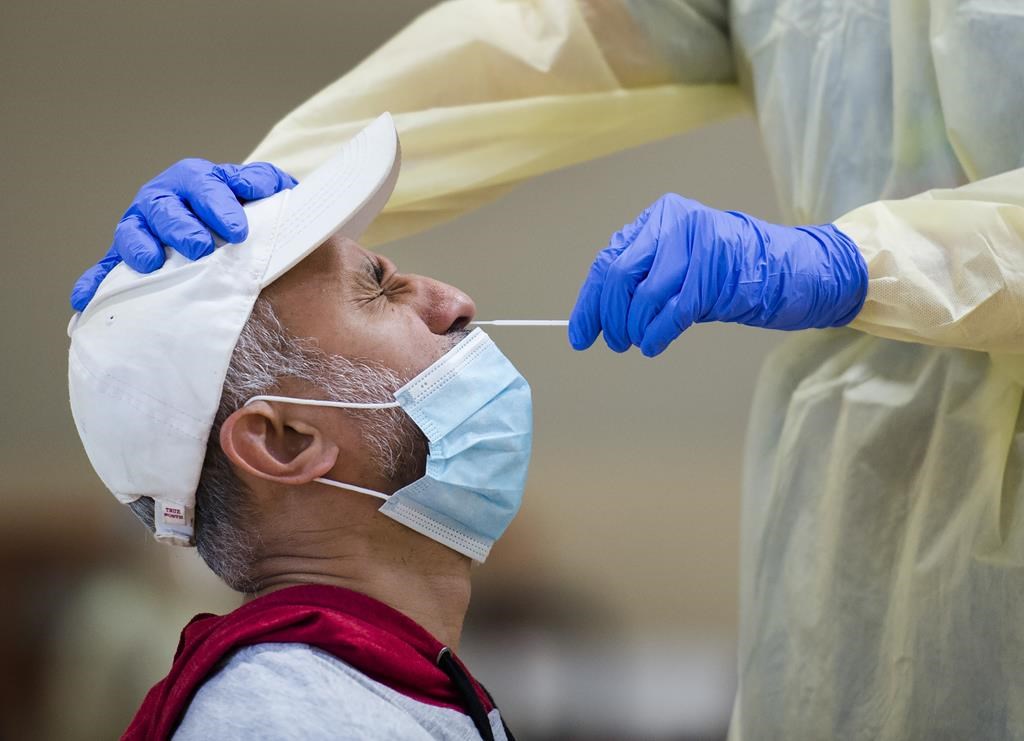
Ontario reported 1,062 new cases of COVID-19 on Sunday as the province passed a sobering milestone.
It’s the fifth straight day more than 1,000 new infections were confirmed, bringing the provincial total to 300,816 since the pandemic began.
The seven-day rolling average of new cases sits at 1,104, which is an increase from 1,031 last Sunday.
Toronto reported 259 new cases while Peel Region added 201 new infections to its total. York Region reported just 86 new cases – the fewest number of new cases since moving into the Red-Control zone last week.
An additional 23 variants of concern were also confirmed in the province with 528 cases of the variant first discovered in the UK. There are 27 variant strains of the virus first confirmed in South African and just three of the variant first discovered in Brazil. The total number of new variants of concern increased by 158 over the last seven days.
Another 20 people have died as a result of COVID-19, none involving residents in a long-term care setting, leaving the provincial death just shy of 7,000.
Provincial officials processed 49,185 tests in the last 24 hour period with more than 18,000 samples remaining to be confirmed.
Another 19,167 vaccines were administered on Saturday, bringing the provincial total up to 687,271. Just over 260,000 Ontarians have been fully vaccinated against COVID-19.
While the number of hospitalizations fell to 627, likely due to the lack of full reporting from hospitals on the weekend, the number of COVID-19 patients in the ICU rose to 289 while those on ventilators also increased to 185.
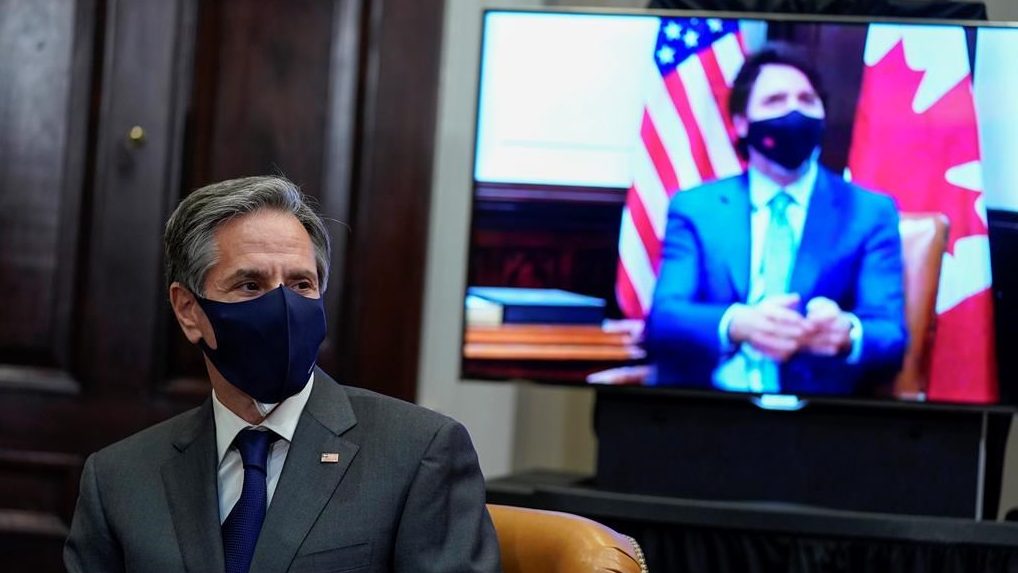
The pandemic diplomacy at work between the United States and Canada is continuing, this time with the secretary of state.
Antony Blinken will visit virtually with Prime Minister Justin Trudeau and Foreign Affairs Minister Marc Garneau as part of the Biden administration’s post-Trump fence-mending campaign.
Blinken’s “virtual trips” to Canada and Mexico mark the secretary’s first bilateral video conferences since taking office.
The visit follows up on Trudeau’s own virtual summit this week with the U.S. president, which produced a “road map” for collaboration on issues like climate change, the economy and COVID-19.
With travel still ill-advised, Trudeau and Garneau will dial in from Ottawa, with Blinken at the State Department’s headquarters in Foggy Bottom.
Spokesperson Ned Price says the agenda includes North American defence, security and human rights in the West and around the world.
That means the conversations will likely include the plight of Michael Spavor and Michael Kovrig, two Canadians who have spent the last two years in custody in China.
Spavor and Kovrig — known in Canada simply as the “two Michaels” — were swept up after Canada’s arrest in December 2018 of Meng Wanzhou, the chief financial officer of Chinese tech giant Huawei.
Meng is in the midst of an extradition hearing in Vancouver to determine whether she should be sent to the U.S. to face fraud charges.
On Tuesday, Biden vowed to work with Canada to secure the two Michaels’ release, but offered no clues as to what specifically the U.S. is prepared to do.
Justice Department spokesman Marc Raimondi would only say the U.S. will “continue to seek extradition” of Meng, who is under house arrest in Vancouver and due back in court Monday.
Earlier this month, Canada, the U.S. and a coalition of 56 other countries collectively denounced the state-sponsored arbitrary detention of foreign nationals for political purposes.
Julie Chung, the acting assistant secretary for State’s Bureau of Western Hemisphere Affairs, said the U.S. supports that measure and backs Canada’s demand for the release of Spavor and Kovrig.
“Human beings should not be used as pawns,” she said Thursday. “We stand by Canada, our strong friend and partner, in the issues of arbitrary detention and for the release of the two Canadian citizens.”
Blinken is also scheduled to meet with a group of Canadian students, as well as with Mexico’s foreign secretary and secretary of the economy during a “visit” to a port of entry facility along the southern U.S. border.
Meanwhile, efforts to fortify Canada-U.S. ties have continued, albeit virtually, along other departmental fronts all week.
Environment Minister Jonathan Wilkinson spoke Wednesday with John Kerry, Biden’s special envoy on climate, to shore up plans for more stringent emissions-reduction targets in advance of a climate summit in April.
And Transportation Secretary Pete Buttigieg and Transport Minister Omar Alghabra have committed to tougher vehicle pollution standards, and collaborating on new standards for aircraft and ships.

A Toronto District School Board (TDSB) student is raising concerns over a “racially insensitive” poem being taught in class which makes references to slavery.
The poem was by French poet Jacques Prevert titled “Pour Toi, Mon Amour,” and was assigned to a Grade 10 virtual French class at Lawrence Park Collegiate Institute.
WATCH VIDEO: https://toronto.citynews.ca/2021/02/25/tdsb-student-raise-concerns-over-racially-insensitive-poem-assigned-to-french-class/
The part of the poem in question when translated into English reads, “‘I went to the scrap market and bought chains, heavy chains. For you, my love.’ And then it proceeds to say, ‘I went to the slave market and I looked for you but I didn’t find you, my love’,” said the student
“There are certain lines in the poem that was said that were inappropriate or culturally insensitive,” they added
The student, who did not want to be identified out of fears of repercussion, says the poem was assigned as part of their poetry unit in their French class on Thursday.
The student said there was no discussion or disclaimer explaining the insensitive nature or even the history of poem.
“In my class, we haven’t had any discussions regarding Black History Month or regarding the fact that it is Black History Month and there are some sensitive topics that will be talked about in this poem. Nothing like that was discussed prior to us getting the assignment,” the student said.
The Grade 10 student said they approached the teacher to discuss why this poem was chosen and the teacher claimed it was part of the curriculum.
“There could be other Black students that have faced racial injustice directly to them and maybe this can offend them in someway you can never know. I just don’t feel this is something that needs to be talked about or taught in classrooms,” they said.
The student tells CityNews they spoke out in hopes of getting the school board’s attention.
“We’re supposed to be going forward when it comes to racism but instead it seems like we’re going backwards because this is still being taught in classrooms. Whether this is an important part of the curriculum or not, this poem is racially insensitive to all black students across the board,” said the student.
The Toronto District School Board said they weren’t aware of the situation until CityNews reached out for a statement, but said the poem is not part of TDSB or Ministry of Education curriculum.
“We have only just learned of this incident and encourage the student and their family to speak with the principal so that we can understand what happened. In the meantime, we can confirm that this poem is not part of any TDSB or Ministry of Education curriculum.” read the statement.
“These kids, us teenagers are the future. We’re the people that will be going further so if this is something that is given and it’s supposed to be looked like that it’s fine just because its a part of the school curriculum,” added the student. “We’re [just] supposed to get it and not question anything, that’s muzzling us. Trying to get us to stop and not make changes for the future.”
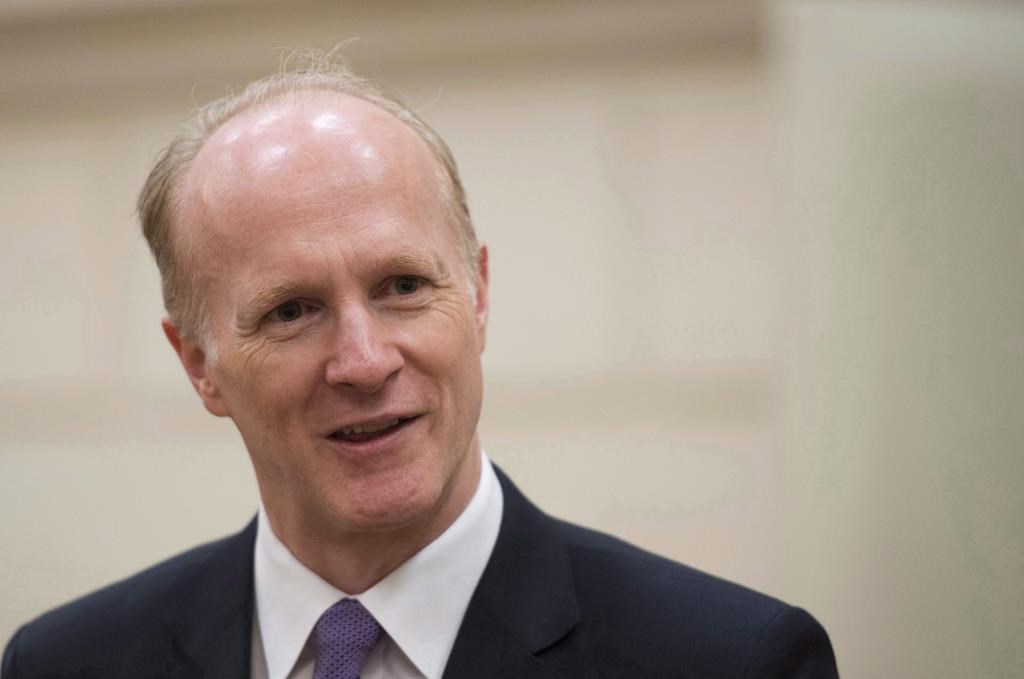
The head of Canada’s largest pension fund received a COVID-19 vaccination while on a “very personal” trip to Dubai, he told staff in an email Thursday night.
Mark Machin disclosed the information in an internal memo after the Wall Street Journal reported he flew to the United Arab Emirates earlier this month, where he received the first dose of the Pfizer-BioNTech vaccine and is awaiting the second dose.
Machin said in the email viewed by The Canadian Press that he remains in Dubai with his partner “for many reasons, some of which are deeply personal.”
“This was a very personal trip and was undertaken after careful consideration and consultation,” the memo reads.
CPP Investments did not immediately respond to requests for comment Thursday evening.
The federal government is actively discouraging Canadians from travelling abroad and recently implemented strict quarantine measures for those returning home.
Machin told staff he followed all travel protocols related to his role as head of the pension fund while on the trip.
“This trip was intended to be very private and I am disappointed it has become the focus of public attention and expected criticism,” he wrote.
Several politicians and health-care officials have become high profile flashpoints of public anger in recent months for leaving the country despite public health advice to the contrary.
Among them, the former CEO of the London Health Sciences Centre is now embroiled in litigation after his travel to the U.S. prompted the hospital to terminate his contract.
Rod Phillips, Ontario’s former finance minister, resigned from his post in late December after taking a personal trip to St. Barts.
CPP Investments, which had $475.7 billion in assets under management as of Dec. 31, invests money on behalf of retired and active employees covered by the Canada Pension Plan.
A spokeswoman for Finance Minister Chrystia Freeland said that while CPPIB is an independent organization, the revelation is “very troubling.”
“The federal government has been clear with Canadians that now is not the time to travel abroad,” Katherine Cuplinskas said in an emailed statement.
“We were not made aware of this travel and further questions should be directed to the CPPIB on this matter.”
Machin, who has been in his current role since 2016, joined CPP Investments in 2012. Prior to joining the pension fund manager, he spent 20 years at investment bank Goldman Sachs.
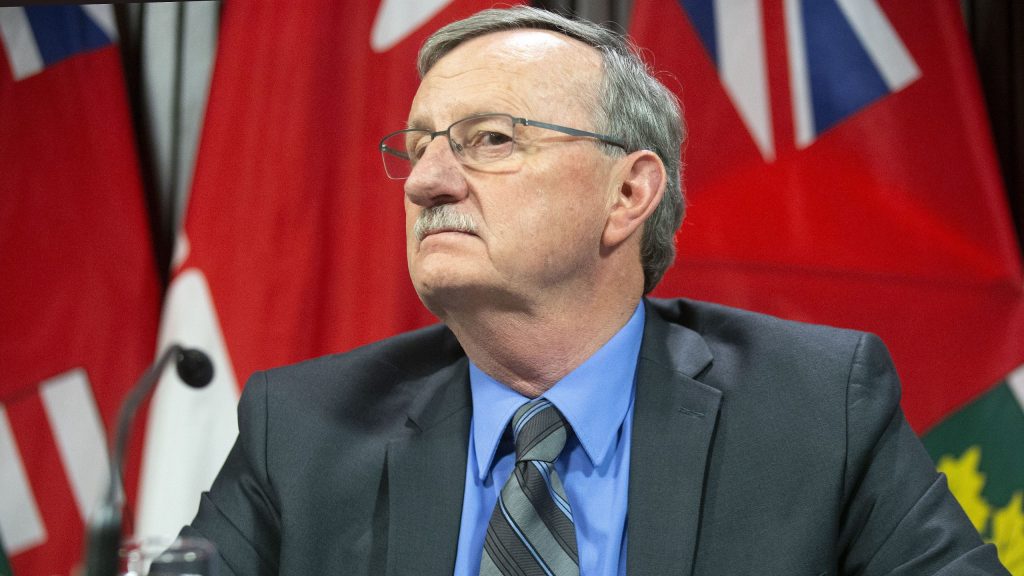
Ontario had no updated plan for dealing with a pandemic when COVID-19 began cutting a deadly swath through the province last spring, a public commission was told.
In testimony before the panel released on Thursday, the province’s chief medical officer of health, Dr. David Williams, denied responsibility for the shortcoming.
The province had developed a pandemic response plan in 2006 that was updated in 2013, but the process stalled after work started on a “Ready and Resilient” blueprint in 2016.
“Do you have any knowledge about the “Ready and Resilient” plan and why it wasn’t completed in four years before COVID?” commission co-counsel John Callaghan asked.
“The process was in place, and they were doing reviews on it,” Williams answered.
“Why was it not done?”
“Because it was not completed.”
The commission is delving into the devastating impact of COVID-19 on Ontario’s long-term care homes. To date, coronavirus disease has killed 3,753 residents and 11 staff members.
Williams said pandemic preparation drifted down the priority list because things had been relatively quiet for several years. Historically, he said, planning focused on influenza A, a situation that hadn’t changed as late as 2019 when the World Health Organization said the world is not ready for a pandemic.
“For seven years, you never felt the need to increase your pandemic plan, your influenza pandemic plan?” Callaghan asked.
“We did quality work back in 2006,” Williams said.
“You are saying, in your opinion, it was your decision not to upgrade the 2013 plan?”
“No, I was not asked to update the plan.”
Williams said he “took flak” over pushing more robust preparation for a major infectious disease outbreak because others saw the exercise as wasting time and resources for something that would never occur.
“It is hard to keep that prevention thing always at the front table because the tyranny of the urgent always pushes things aside,” Williams said. “It was to me disappointing to find the lack of depth and breadth of infection prevention and control expertise that was available out there.”
Williams said he was shocked to discover the poor situation at long-term care homes when it came to masks and other personal protective equipment. The purpose of the provincial stockpile, he said, was to equip front-line doctors and their offices, not long-term care facilities.
Nursing homes, he said, were supposed to have their own supplies able to last between four and seven weeks. However, when the pandemic hit in earnest, he learned most of the protective equipment was made in China and global demand had outstripped supply.
“That was startling and shocking to me that that had happened in there because it is something that I thought we had in-house; anyways in North America at least,” he said.
Constant staff turnover of key personnel in nursing homes hampered efforts to ensure adequate infection prevention controls were in place, he said.
“The changeover was at times disconcerting,” he said.
Callaghan called it “vexing” the commission had received 217,000 pages of documents from Williams only in the week before he testified. The co-counsel also noted Williams had provided 2,000 pages of his redacted notes.
New Democrat Leader Andrea Horwath said Williams’ testimony made it “astoundingly clear” the government was trying to hide its response to COVID-19 in nursing homes.
“The Ford government and Dr. Williams are taking great pains to hide, bury and cover up how they dealt with COVID-19 in long-term care homes,” Horwath said.
Ingredients
- Wet ingredients
- 3 very overripe medium bananas, mashed (1 ¼ cup mashed overripe banana)
- 4 large eggs, at room temperature
- 3/4 cup pure maple syrup
- ¾ cup natural creamy peanut butter (only peanuts & salt as ingredients)
- 2 teaspoons vanilla extract
- Dry ingredients
- 2 cups packed super fine blanched almond flour (I use Bob’s Red Mill)
- ½ cup coconut flour (do not pack)
- 1 teaspoon baking soda
- 1/2 teaspoon salt
- 1 cup mini chocolate chips, dairy free if desired
- For the frosting:
- ½ cup butter, at room temperature (or sub vegan butter)
- ½ cup natural creamy peanut butter (just peanuts + salt)
- 2 cups powdered sugar
- 1 teaspoon vanilla
- 2-3 tablespoons unsweetened almond milk (or milk of choice), to make the frosting creamy
- To garnish the cake:
- Mini chocolate chips around the edges of the cake
Instructions
- Preheat oven to 350 degrees F. Line the bottom of three 6-inch round cake pans or two 8-inch round cake pans with parchment paper rounds. Spray parchment paper and sides of pan with nonstick cooking spray. YOU SHOULD USE PARCHMENT PAPER or the cake is likely to stick. Please do not forget.
- In a large bowl, whisk together mashed bananas, eggs, pure maple syrup, peanut butter and vanilla extract until smooth.
- In a large bowl, whisk the almond flour, coconut flour, baking soda and salt together. Set aside. Add dry ingredients to wet ingredients and mix with a wooden spoon until well combined. Fold in mini chocolate chips.
- Divide batter evenly between pans and spread out with a spatula to smooth the tops. Bake for 20-30 minutes if using two 8-inch pans and 25-35 minutes for three 6-inch pans. Cakes are done when a tester comes out clean or with just a few crumbs attached. Allow cake to cool completely before frosting or removing from the pans. The cake should be room temperature or cold when you frost it. This is very important. Cakes can be made a day ahead and stored in the fridge if you’d like.
- Make your frosting: In the bowl of an electric mixer, add the softened butter and peanut butter and whip on high until light and fluffy. Add powdered sugar, vanilla and 2 tablespoons almond milk. Beat slow at first, then increase speed to high and beat for approximately two minutes. Frosting should be nice and creamy, if you want it extra creamy, add another tablespoon of almond milk and beat again.
- Now it’s time to frost the cake: place about 1-2 tablespoons down onto the cake stand and spread out. Invert 1 cake onto the cake stand, add about ½ heaping cup frosting between each layer, repeat with each cake, then frost the top and sides of the cake with the remaining frosting. If you’d like, you can do a crumb coat for the frosting first (to avoid crumbs in the frosting) by doing the following: Frost the layers as you normally would and then coat the outside of the cake with a very thin layer of frosting and place in fridge for 10-15 minutes before you finish frosting. This is so that the crumbs stick to this layer of frosting and not your main layer.
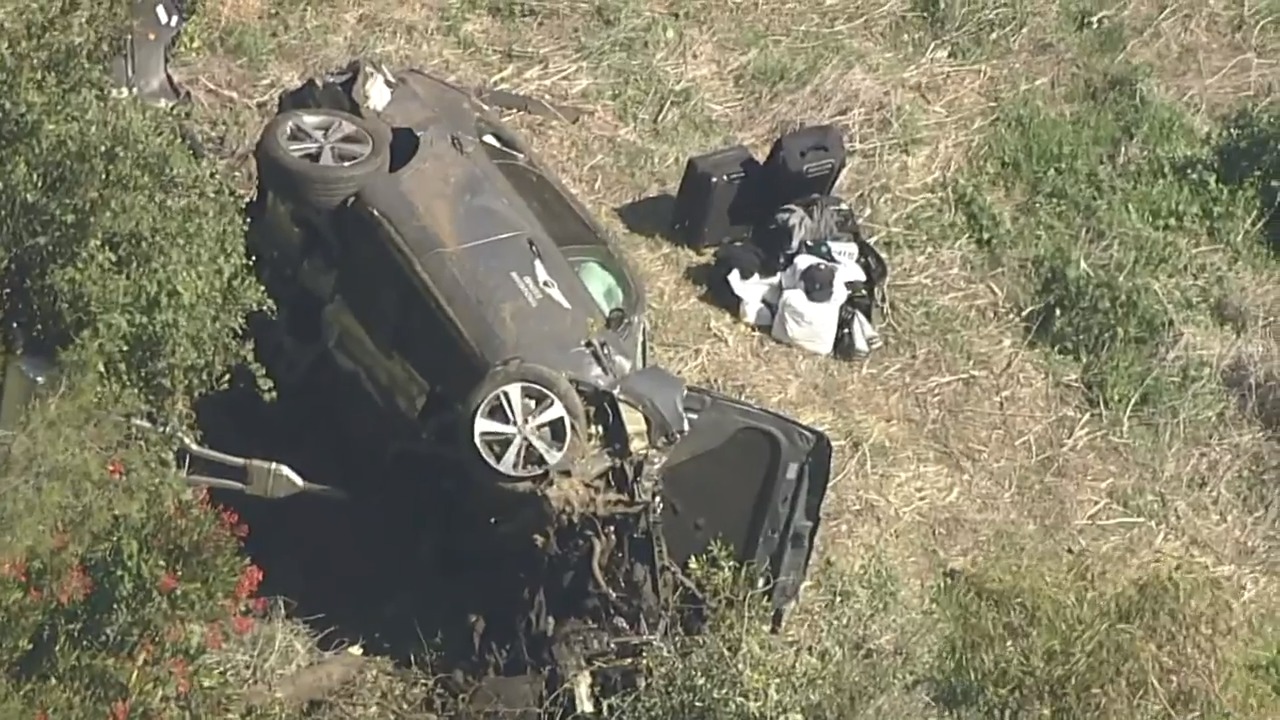
The Los Angeles County sheriff on Wednesday characterized the crash that seriously injured Tiger Woods as “purely an accident” and appeared to rule out any potential criminal charges even as authorities were still investigating.
Deputies did not see any evidence that the golf star was impaired by drugs or alcohol after Tuesday’s rollover wreck on a downhill stretch of road known for crashes, Sheriff Alex Villanueva said.
“He was not drunk,” Villanueva said during a livestreamed social media event. “We can throw that one out.”
Woods, who had checked into a clinic in 2017 for help dealing with prescription medication, was driving alone through coastal Los Angeles suburbs when his SUV struck a raised median, crossed into oncoming lanes and flipped several times. The crash caused “significant” injuries to his right leg, and he underwent a “long surgical procedure,” according to a post on the golfer’s Twitter account.
Villanueva said investigators may seek search warrants for a blood sample to definitively rule out drugs and alcohol. Detectives also could apply for search warrants for Woods’ cellphone to see if he was driving distracted, as well as the vehicle’s event data recorder, or “black box,” which would give information about how fast he was going.
Joe Giacalone, a professor at the John Jay College of Criminal Justice and a retired New York police sergeant, said it was “premature” for Villanueva to determine the crash was an accident just a day later.
“The blood test could give us a whole other insight,” Giacalone said, noting that some drugs are not necessarily detectable by observation. “Because it’s Tiger Woods, people are going to demand answers. You have to dot your I’s and cross your T’s.”
Crash investigations typically include interviews of first responders and bystanders as well as inspections of the road and the vehicle, including photographing and measuring the scene and checking to see if the vehicle had defects or malfunctions, according to William Peppard, a retired Bergen County, New Jersey, police detective who has served as a crash investigator.
Peppard said in typical cases with no immediate indications the driver was impaired, detectives might not seek blood samples if the crash did not injure anyone else or damage property.
“Take the celebrity out of it – it’s a matter of resources and time,” he said.
The crash was the latest setback for Woods, who at times has looked unstoppable with his 15 major championships and record-tying 82 victories on the PGA Tour. He is among the world’s most recognizable sports figures, and at 45, with a reduced schedule from nine previous surgeries, remains golf’s biggest draw.
He won the 2008 U.S. Open with shredded knee ligaments and two stress fractures in his left leg. His personal life imploded in 2009 when he was caught having multiple extramarital affairs and crashed his vehicle near his Florida home. He returned to win his 11th award as PGA Tour player of the year and reach No. 1.
In 2017, Florida police found him asleep behind the wheel of a car parked awkwardly on the side of the road. He was arrested on a DUI charge and said he had an unexpected reaction to prescription medicine for back pain. Woods later pleaded guilty to reckless driving and checked into a clinic to get help with prescription medication and a sleep disorder.
And then after four back surgeries that kept him out of golf for the better part of two years, he won the Masters in April 2019 for the fifth time, ranking among the great comebacks in golf.
Woods had a fifth back surgery, a microdiscectomy, on Dec. 23, just three days after he played the PNC Championship with his son Charlie, now 12.
Woods was in Los Angeles over the weekend as the tournament host of the Genesis Invitational at Riviera Country Club. Monday and Tuesday had been set aside for him to give golf tips to celebrities on Discovery-owned GOLFTV.
Woods was driving his courtesy vehicle from the Genesis Invitational when he crashed. Deputy Carlos Gonzalez, who was the first to arrive at the crash, patrols the road and said he sometimes catches people topping 80 mph (129 kph) in the downhill, 45-mph zone. Crashes are common.
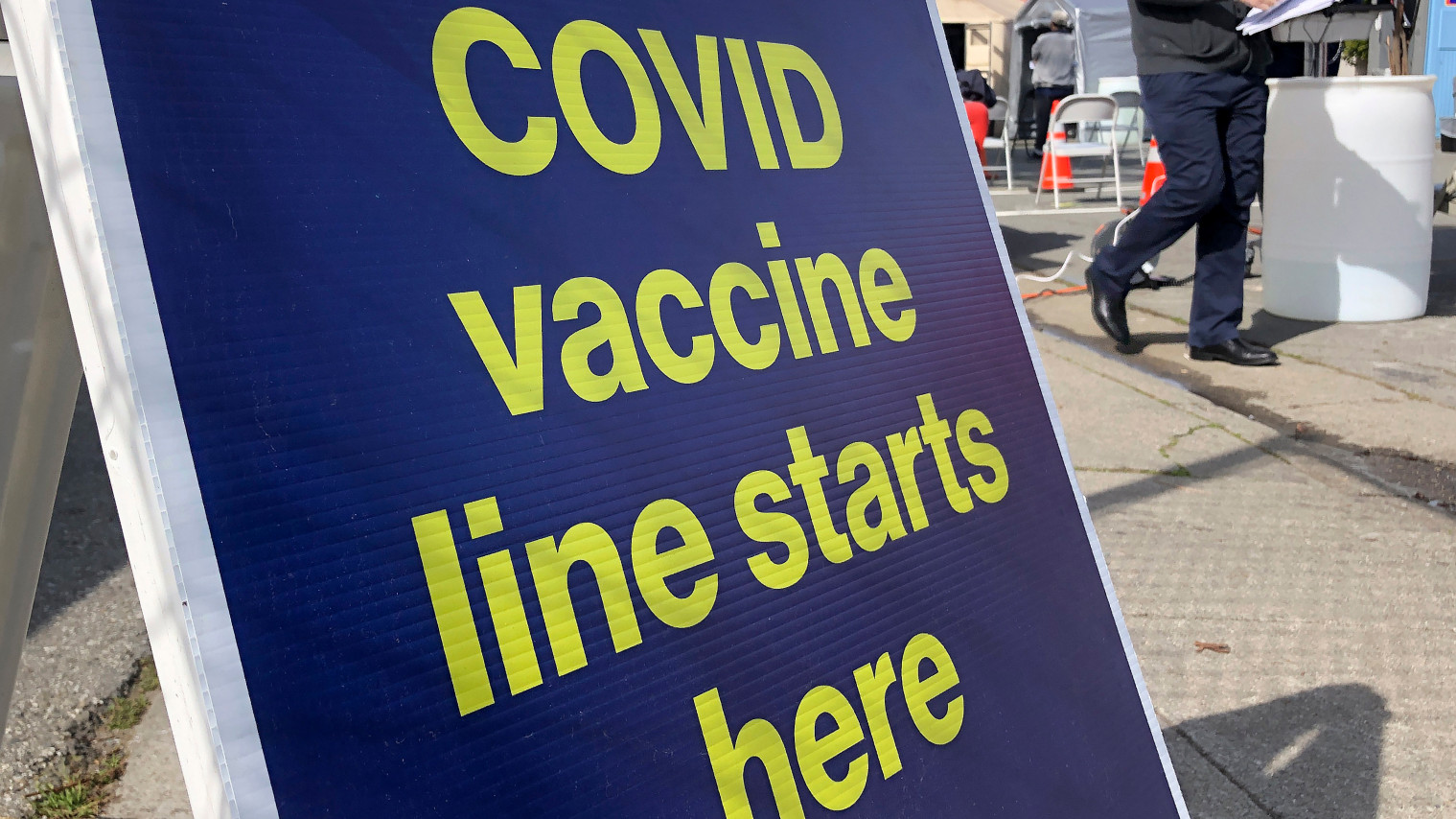
Ontarians 80 years and older will start to get vaccinated during the third week of March, says the head of the province’s vaccine task force.
WATCH: https://toronto.citynews.ca/2021/02/24/covid-vaccine-phase-2-ontario/
Retired General Rick Hillier says Phase 2 of Ontario’s COVID-19 vaccination plan will begin next month and those 80 years and older should start getting their first doses starting the week of March 15.
An online booking system and service desk will become available on that date as well and people in that 80 and older age range, or those booking for them, can access it.
WATCH: https://toronto.citynews.ca/2021/02/24/covid-vaccine-phase-2-ontario/
“Unless you’re 80-years-old or unless you’re acting to get a reservation for somebody who is 80-years-old or more, please do not go online. You will not be permitted to go through the system if you’re not in that age bracket,” Hillier warned against anyone attempting to jump the queue.
Quebec’s portal to book online vaccines is scheduled to go live this week, but Hillier it’s not necessary yet in Ontario because they are completing the first phase of vaccinations for long-term care residents and health care workers. Those individuals are expected to receive their second doses by next week.
Hillier says the task force aims to then vaccinate adults aged 75 and older starting April 15, and shots will go to those 70 and older beginning May 1. He says people aged 65 and older will be vaccinated starting June 1.
Vaccinations in populations considered high-risk, including Indigenous adults, will continue during that phase and essential workers will begin getting their shots in May.

Hillier says pharmacies will also begin assisting with vaccinations during Phase 2, which will take much of the strain off hospitals in case there is a surge in new COVID-19 cases.
Hillier says they hope to complete between 16,000 to 18,000 vaccinations a day but he cautioned that Ontario’s plan is dependent on vaccine supply from the federal government.
Hillier also expressed skepticism about the federal government’s timeline for inoculating all Canadians. Ottawa has consistently said that everyone who wants a vaccine will be able to get one by the end of September, but Hillier isn’t so sure.
“I’d love to say, yeah by Labour Day weekend we’re going to have every single person in Ontario who is eligible and who wants a vaccine to have one. I’m a little bit reluctant to do that because it depends on the arrival of those vaccines.”
Dr. Nathan Stall, a geriatrician at Toronto’s Mount Sinai Hospital, called the province’s vaccine rollout to seniors slow and “extremely disappointing,” noting that the group represents more than 95 per cent of COVID-19 deaths in Ontario to date.
He said the plan to vaccinate essential workers at the same time as older adults will complicate efforts, and called for greater transparency on how groups are being prioritized.
“Let’s simplify it and let’s focus our supply of vaccine where we know deaths and hospitalizations are occurring,” Stall said in an interview.
Hillier said he would have liked to see the booking system up and running sooner but noted that it hadn’t been required for the high-priority populations the province has so far focused on, such as those in long-term care.
He added that some private-sector companies with large operations have offered to vaccinate their essential workers, their families and communities when the time comes and the province intends to take up those offers.
Premier Doug Ford said his province is lagging behind others – such as Alberta – in offering vaccines to adults under age 80 because Ontario has a larger population with more people in long-term care.
He said the rollout is focused on those most at risk and argued the plan depends on supply.
“The bottom line is, we need vaccines. If we had millions of vaccines, it’d be a lot easier,” Ford said Wednesday.
“When we get to that point, everyone will know when their turn is coming.”
NDP leader Andrea Horwath accused the Ford government of botching the vaccine rollout, calling it “terrifying.”
Horwath predicts the goal of having everyone in Ontario vaccinated by the end of the summer won’t happen. She says the Ford government has been incompetent in the handling of the virus.
Liberal health critic John Fraser said the government seems unprepared for the broader distribution of vaccines.
“People want answers. They didn’t get any answers this morning, other than it’s taking longer than we thought it would, and we’re actually not ready,” Fraser said.
A total of 602,848 vaccine doses have been administered in the province so far with 251,590 people having received both doses.


















